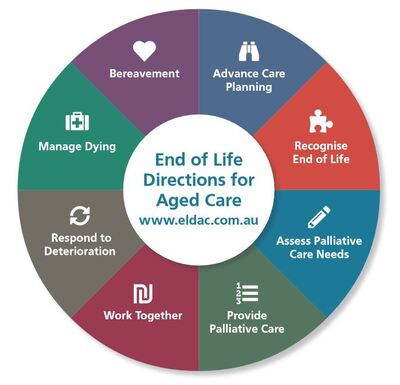A palliative care digital dashboard for the aged-care sector

Australian Institute of Health and Welfare data shows that three in five Australians over 65 years of age were clients of an aged-care program when they died, and that 43% of all people over 65 who died were living in residential aged care.1
The aging population increases pressure on aged-care provision and highlights the potential contribution of innovative approaches that support the identification and delivery of care to older people as they approach the end of their life, and who may have palliative care needs.2
The Technology Solutions stream of work conducted under the End of Life Directions for Aged Care (ELDAC) project is looking at a range of technology innovations relevant to the care of older people at the end of life (EOL). Funded by the Australian Government, the ELDAC project is conducted by a national consortium of eight partners — three universities and five national agencies: Queensland University of Technology (QUT), Flinders University of South Australia (FUSA), University of Technology Sydney (UTS), Palliative Care Australia (PCA), Aged & Community Services Australia (ACSA), Leading Age Services Australia (LASA), Australian Healthcare and Hospitals Association (AHHA) and Catholic Health Australia (CHA).
To support aged-care workers in planning and providing good-quality palliative and EOL care, the ELDAC team at Flinders University created an integrated palliative care web platform known as the ELDAC Digital Dashboard. The dashboard is developed based on the Aged Care Quality Standards and the National Palliative Care Standards. Built using a ‘co-design’ approach, the dashboard makes use of the ELDAC Care Model to provide prompts and triggers to guide care. It provides guidance on advance care planning, recognising the EOL, assessing palliative care needs, providing palliative care, working together as a multidisciplinary team, responding to deterioration, managing dying and offering bereavement support. The ultimate aim of the dashboard is to support workforce understanding and capability around palliative care so that older Australians receive high-quality, person-centered care at the end of their lives.
One of the unique abilities of the dashboard is that it uses existing data that is captured within an aged-care service’s clinical data management system, processes it, and provides a one-stop shop for clinicians to graphically view and track all relevant EOL care activities and processes of their residents/clients. There is no need to feed data to the dashboard, which makes it ideal for integration into existing clinical data management systems, as opposed to being a standalone piece of software with additional management and application requirements.
The dashboard prototype was built on a review of aged-care resources, articulation with standards and a co-design process, with work completed in 2019. Since then, it has been integrated into the clinical and care systems of four aged-care IT providers, providing the opportunity to examine how it could be adopted and used in aged-care services with access to the four IT companies’ systems. In the second half of 2020, a three-month implementation evaluation study was conducted involving services that had access to the newly integrated dashboard. Care managers, nurses and admin staff used the dashboard for a trial period of up to eight weeks, with the support of a site-based ‘dashboard champion’.
At the end of the trial period, over 40 staff members from 14 sites participated in a focus group or interview sessions to share their experience of dashboard use. Aged-care staff noted that the dashboard was easy to use and that it helped them organise EOL care. It is worth noting that this implementation occurred in an extremely challenging period marked by COVID-19 concerns, time and resource pressures, competing priorities and a relatively low level of technology readiness within the sector. Despite these challenges, staff and managers reported that the dashboard facilitated family conversations about a resident’s decline and care needs, particularly when recognition of gradual EOL decline was presented to the team.
Care mangers found the dashboard useful for the purposes of audit, compliance, and to assure accountability in the EOL processes provided at their service. For some services, the role of EOL and palliative care was still evolving, so having access to the associated suite of ELDAC resources was seen as valuable. In terms of driving and embedding a technology dashboard, the role of a site-based dashboard champion was seen as critical.
Innovations such as the ELDAC Digital Dashboard show that technology and digital resources can support staff and services in identifying and responding to an older person’s needs as they move into the last months, or year, of life, as well as responding to specific palliative care needs. The ELDAC Digital Dashboard enhanced the capacity of existing systems by creating a framework to organise existing data that can highlight EOL needs and assist services in examining their care processes. The importance of digital systems and technology solutions has already been identified as a key direction for the aged-care sector, as has the need to provide person-centred and quality care for older people coming to the end of their life.
For more information about the ELDAC Digital Dashboard, please contact Dr Priyanka Vandersman: Priyanka.Vandersman@flinders.edu.au.
References
- Australian Institute of Health and Welfare. Use of aged care services before death. https://www.aihw.gov.au/getmedia/c1731ae2-e3ae-440f-994b-5b54b639ed05/18510.pdf.aspx?inline=true
- Palliative Care Australia. Palliative Care in Aged Care. https://palliativecare.org.au/palliative-care-in-aged-care
A Day in the Life of Amanda Bartosewicz
Despite encountering some very challenging circumstances and setbacks in her personal life,...
Should older people take driving lessons?
The latest research into older driver behaviour suggests that that tailored driving lessons can...
In conversation: the truth about after-death administration
Did you know it takes the average executor in Australia 200–300 hours to fully administer...




